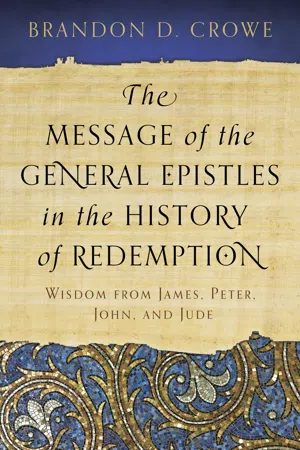
eBook - ePub
The Message of the General Epistles in the History of Redemption
Wisdom from James, Peter, John, and Jude
This is a test
- English
- ePUB (mobile friendly)
- Available on iOS & Android
eBook - ePub
The Message of the General Epistles in the History of Redemption
Wisdom from James, Peter, John, and Jude
Book details
Book preview
Table of contents
Citations
About This Book
Considers the theological richness and practical implications of the New Testament General Epistles—James, 1–2 Peter, 1–3 John, and Jude—with particular sensitivity to their place in the flow of redemptive history.
Frequently asked questions
At the moment all of our mobile-responsive ePub books are available to download via the app. Most of our PDFs are also available to download and we're working on making the final remaining ones downloadable now. Learn more here.
Both plans give you full access to the library and all of Perlego’s features. The only differences are the price and subscription period: With the annual plan you’ll save around 30% compared to 12 months on the monthly plan.
We are an online textbook subscription service, where you can get access to an entire online library for less than the price of a single book per month. With over 1 million books across 1000+ topics, we’ve got you covered! Learn more here.
Look out for the read-aloud symbol on your next book to see if you can listen to it. The read-aloud tool reads text aloud for you, highlighting the text as it is being read. You can pause it, speed it up and slow it down. Learn more here.
Yes, you can access The Message of the General Epistles in the History of Redemption by Brandon D. Crowe in PDF and/or ePUB format, as well as other popular books in Theology & Religion & Biblical Studies. We have over one million books available in our catalogue for you to explore.
Information
Topic
Theology & ReligionSubtopic
Biblical StudiesPart 1
Scallywags
1
An Eternal Inheritance:
Salvation in 1 Peter
Salvation in 1 Peter

Blessed be the God and Father of our Lord Jesus Christ! According to his great mercy, he has caused us to be born again to a living hope through the resurrection of Jesus Christ from the dead, to an inheritance that is imperishable, undefiled, and unfading. (1 Peter 1:3–4a)
But you are a chosen race, a royal priesthood, a holy nation, a people for his own possession, that you may proclaim the excellencies of him who called you out of darkness into his marvelous light. (1 Peter 2:9)
[Jesus] himself bore our sins in his body on the tree, that we might die to sin and live to righteousness. By his wounds you have been healed. (1 Peter 2:24)
As we boarded the train in Paris that January evening, it was already getting dark. Along with four friends, I was on my way to Normandy to visit the famous D-Day beaches where the Allied troops had landed in Europe during World War II. Being entrusted with the map, I was fairly certain I knew where we were going, and the appropriate station at which to disembark, but backpacking through Europe is not always a precise science. We had no hotel reservations, we had no plan of transportation once we got off the train, and none of us spoke French very well. (I might add that this was before the days of ubiquitous smartphones and GPS devices.) As we had already done on a number of occasions, we were planning on walking a short distance from the train station until we found suitable lodging for the night. When we stepped into the darkness of rural France, however, we could see little, aside from the train heading methodically down the rails to its next destination. We were on our own.
We headed in the direction where we surmised the closest town must be, but there were no landmarks, no lights, and apparently no end in sight. After what seemed like an hour, we finally found a building with the lights on. We stopped and asked directions, only to discover that the language was a significant barrier. After doing our best to translate the directions we received, we resumed our journey, but found ourselves back at the same place some time later! It was a frustrating and desperate feeling. When we eventually found a hotel, it was much nicer than anything we were used to. Despite the cost, we booked our rooms right away. When I removed my backpack that evening, the burden that was lifted was as much psychological as physical. We had finally made it to a haven of rest after being lost in the darkness of a foreign country.
Perhaps you have had a similar experience. It is an unsettling feeling to be in a strange place and not know what to do next. In many respects, this was the situation facing the first readers of 1 Peter. Peter wrote this letter to Christians who had very likely been displaced from their homes and transplanted in a foreign land far away from all that was familiar. But they were also navigating a more fundamental issue, one that all Christians can identify with. The recipients of the letter found themselves professing a faith in a world that did not understand their convictions, which often led to pressures and persecutions. As we will see in this chapter, however, Peter wrote to encourage Christians with the immeasurable love of God directed toward them, even in the midst of their difficult circumstances. Although his readers were facing the vicissitudes of uncertainty, Peter explains that a glorious reward, one that is eternally secure, is laid up in heaven for them. In this chapter, we will primarily consider the theological underpinnings of Peter’s message; in the next chapter, we will see how a solid grasp of the love of God for us in Christ empowers us to live faithfully in the present age, even in the face of fiery trials.
Elect Exiles: The Audience of 1 Peter
The Historical Context of Exile
The apostle Peter addresses his first epistle to the elect exiles of the Dispersion in various portions of what is called Asia Minor (modern-day Turkey): Pontus, Galatia, Cappadocia, Asia, and Bithynia. Who were these people, and why were they described as exiles? Although we cannot be certain of all the historical details, the audience may have comprised Christians who had left Rome behind to be resettled in these Roman provinces.3 If so, they may have gone to Asia Minor willingly, with the prospect of new opportunities. But it is more likely that they would have been forced to leave Rome because they were viewed as foreigners who were a threat to the order of Rome. We know, for example, that the emperor Claudius (reigned a.d. 41–54) established Roman cities in all five of the provinces mentioned in 1 Peter 1:1. We also know that Claudius was zealous for traditional Roman religion, and he expelled Jews from Rome in the a.d. 40s (see Acts 18:2). The Roman historian Suetonius, writing in the early second century a.d., even connects the expulsion of Jews from Rome to a certain Chrestus, which may be a misspelling of Christus, the Latin word for Christ.4 If so, Claudius’s deportations of Jews may also have included Christians. (In the early days of Christianity, it was often difficult for outsiders to distinguish between Christians and Jews.)
Thus, it is quite plausible that Christians may have been forced to leave Rome because of their religious beliefs. If so, it may also be true that these deportees would not have officially been Roman citizens, even if they and their families had lived in Rome for generations. This would leave them in the uncomfortable situation of being a people without a homeland: though they were living in Rome, their lack of Roman citizenship meant that they had to leave behind the only place that many of them probably ever knew as home. When they were resettled in Asia Minor, they were also viewed as outsiders by the local populaces. If this historical reconstruction is correct, then the audience may quite literally have been exiles without a homeland.
To make matters worse, even though the political and religious pressures of the city of Rome may have been left behind, the exiles were not free from religious, political, or social pressures in Asia Minor. There would have been immense pressure for the dispersed Christians to conform to local religious and cultural customs; failure to do so would have led to antagonism and accusations. For example, if Christians were abstaining from worshiping traditional deities who were thought to bless Rome, then they would have been considered to be unpatriotic scallywags.5 (In ancient Rome, religion and society were closely intertwined in ways that may strike many today, especially in the United States, as foreign.) How, then, could Christians live faithfully in a society that did not understand—much less abide by—Christian beliefs? Christians were viewed as immoral (their lifestyles did not accord with the broader culture, see 1 Peter 3:16; 4:4) and atheistic (Christians denied the traditional pantheon of gods).6 The word Christian was even used in the early days of the church as a derogatory term (4:14, 16). Peter writes in the midst of this anti-Christian context, making it clear to his audience of Christians that they should supply no ground to the charge of being scallywags. As we will see in the next chapter, Christians are to be model citizens, paragons of patience, and steadfast in their love (2:15; 3:9, 13, 16).
Exile in Scripture
Whatever the details of the historical situation in 1 Peter, the theological message of elect exiles is clear. Exile is an important theme in Scripture. In the Old Testament, exile is set forth as the preeminent covenantal curse if God’s people turned aside to other gods and forsook the Lord (Lev. 26:27–39; Deut. 28:25–68). Exile meant that God’s people were expelled from the Promised Land and were subject to pagan kings who had no desire to live according to God’s law. To be in exile would be to hit r...
Table of contents
- Contents
- Foreword
- Preface
- Introduction
- Abbreviations
- Part 1: Scallywags
- Part 2: Scoffers
- Part 3: Schisms
- Part 4: Wisdom
- Appendix: Additional Notes on Difficult Texts
- Bibliography
- Index of Scripture
- Index of Subjects and Names